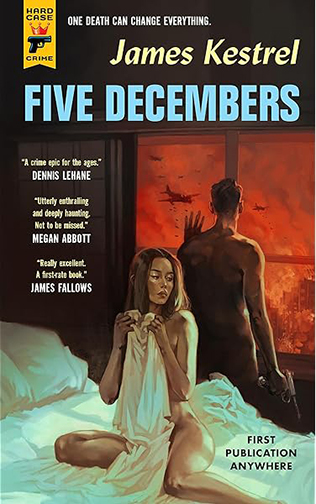Home »

Hardcase Crime serves up a quality work
Book Review
By Derryll White
Kestrel, James (2021). Five Decembers.
“I fear all we have done is to awaken a sleeping giant and fill him with a terrible resolve.”
 Isoroku Yamamoto (Marshal Admiral of the Imperial Japanese Navy)
Isoroku Yamamoto (Marshal Admiral of the Imperial Japanese Navy)
James Kestrel is a pleasure to read. He is detailed in each scene he builds, with information most readers won’t have easy access to. The story flows across five years, maintaining a continuity that builds to each specific event. And each event links.
Kestrel moves with care. His words catch the flavour of Guam, Tokyo and Hong Kong as the Second World War approaches. His blunt language gives the reader the feeling of Raymond Chandler, but the scenes are not the hardscrabble back alleys of Los Angeles – they are of exotic places preparing for and enduring war. Through it all Honolulu detective Joe McGrady hunts.
Much of this novel is wrapped in World War II. Joe McGrady spends it in Japan cloistered on a mountain in a Japanese house and garden, and the author offers a unique view into all that happens during the tempestuous war years. For those readers interested in the Second World War ‘Five Decembers’ offers some truly different insights. For those of a more genre-based interest, the mystery continues. James Kestrel creates a vivid canvas where human emotion and desire paint the scenes.
As usual the publisher, Hardcase Crime, serves up a quality work that will enhance its line for years to come.
********
Excerpts from the novel:
PEARL HARBOR – Beamer turned to the left. He nudged into the line of cars waiting to enter Pearl Harbor’s east gate. McGrady watched ahead. The Walanae Mountains were blue-green in a haze of cane field smoke. A squadron of planes came in low through the gap in the ridgeline, their props catching the sun and tracing gold circles as they banked in unison.
Beamer stopped at the gate and flashed his gold star. The gate lifted and Beamer drove on. Ahead of them, the submarine escape and training tower rose 10 storeys high, rusted spiral stairs wrapping the water tank all the way to the top. COMSUBPAC headquarters stretched in a long concrete U. A green lawn lay between it and the docks. Past it, McGrady counted six subs.
HONG KONG – Behind the hotel was a labyrinth of alleyways. Everything was on offer. All of it was cheap. Food and liquor. One-room brothels. Girls waited by their staircase if they didn’t have a john. Other stairways led up into darkness. The rafters groaned. He took a meal of dumplings and noodles and ate it at a low wooden table in the middle of a covered alley that was choked with steam and noise. The woman who owned the shop poured him a cup of clear baijiu liquor that he hadn’t asked for. He paid for it anyway and drank it.
COP SENSE – It was on the other side of the street. It had a wooden sign above the door. Weather-faded script, both English and Chinese. It was a narrow tenement, four storeys high, in a tightly packed block. He had a cop’s eye for vice. It didn’t matter which country he was in. He guessed half the businesses on the block were brothels. The other half depended on them.
WAR ACCOMMODATION – He walked down Hotel Street. It had changed since ’41. In the last 18 months of the war, Gabrielson and the Army pulled out of the hotel business. They yanked licenses. They shut everything down. No more clinics. No more girls locked in the Territorial Hospital’s whore ward and their flare-ups died down. The madams and their girls were free. They could swim on Waikiki beach. They could leave Chinatown, set themselves up anywhere they pleased, and conduct their business any way they wanted. The only catch was Chief Gabrielson, and the vice squad had better not find them.
WORKING GIRL – “With Danny Boy, we had to give all the money to him,” Michelle said. “Even tips. He decided if we got to keep any. He figured Dorothy was skimming. So it’s like Kate said – he beat her up and kicked her out. He took all her things and threw them in the canal.”
“She went to Hotel Street. She found a madam and got a room,” Kate said. “There was nowhere else. Not for a girl like her.”
 – Derryll White once wrote books but now chooses to read and write about them. When not reading he writes history for the web at www.basininstitute.org
– Derryll White once wrote books but now chooses to read and write about them. When not reading he writes history for the web at www.basininstitute.org







